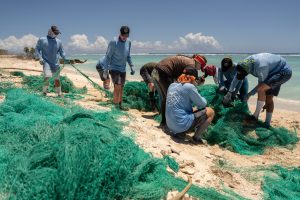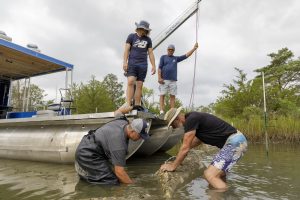With rising surface temperatures and sea level how will coastal septic system fair?
By Meredith Haas of Rhode Island Sea Grant
Septic systems play a valuable role in protecting our drinking water as well as vulnerable coastal ecosystems by treating household wastewater that would otherwise contaminate local water sources. Nearly 25 percent of the U.S. population relies on septic systems, which in many rural and coastal communities is the only means to treat wastewater.
With global sea level rise and surface temperature projections expected to double or quadruple by 2100, septic systems, especially those near coastal waters, are more vulnerable to failures from saltwater intrusion, flooding from a rising groundwater table, and alterations to soil biochemistry from warming temperatures that interfere with wastewater treatment, says George Loomis, a soil scientist and director of the New England Onsite Wastewater Training Center at the University of Rhode Island.
“Changing temperature and precipitation patterns, compounded with periods of very wet conditions and sea level rise, will contribute to septic system failure,” he said.
Loomis is part of a research team supported by Sea Grant at the University of Rhode Island that is looking at the current designs and parameters for septic systems against various climate change scenarios on soil aeration and texture, soil microbial ecology, nitrogen dynamics, and overall soil performance of septic system treatment in low lying coastal soils. Jose Amador, URI professor of natural resources and the team’s research leader, says that this research may be the first in the country to be looking at septic systems and climate change. “It’s an issue that has been talked about all over the country, but we’re the first ones with an experiment.”
The team is utilizing soil samples to test new alternative treatment technologies against conventional septic system designs and comparing their effectiveness in wastewater treatment in the various scenarios of warming surface temperatures and rising sea level.
We can theorize what’s going to take place, but it’ll be nice to know definitively to make management projections that will enable decision makers to mitigate those outcomes,” said Loomis, who recommends that, for the time being, local management agencies focus on mapping at-risk systems, evaluating technology, and retrofitting failing systems to advanced technologies that utilize surface soils to offset impact from a rising groundwater table.
The team’s next goal is to investigate the application of silver and copper nanoparticles in drainfields to aid in pathogen reduction, which may augment treatment that soil microbes normally provide and may help mitigate climate impacts to already existing conventional systems in coastal zones.
We want to see if there is a way to convert drainfields into a better treatment system that may buy existing conventional septic systems another decade of effective operation under climate change conditions,” said Loomis, explaining that silver nanoparticles have been used to treat water in developing countries and are found in athletic and military clothing as an odor and bacteria-killing agent.


